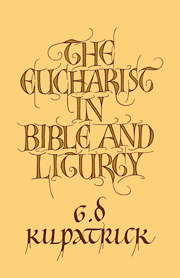Lecture VIII
Conclusion
Published online by Cambridge University Press: 29 September 2009
Summary
Conclusion
We have seen that, while the Godward reference was not originally present in all sacrifices, gradually it was extended to cover most of them until at last sacrifice might be described as an institution at home in the meeting of God and man. Further the beneficiaries of sacrifice, if so we may call them, were, to start with, gods, men and things, but in due course the benefits of sacrifice were confined to God and men. Things, material objects, played a part only as accompaniments of the traffic from men to God. While they were never eliminated, they formed a less and less significant element in the exchange between God and men. More and more the items of exchange were, from the side of God, life and power, and, from men, the offering of praise and worship.
In general terms these are basic ideas in the more developed forms of sacrifice. While we can still detect in the Old Testament more primitive notions, they do not detract from the basic idea that sacrifice is involved in the meeting and exchanges of God and men. We recognise, of course, that this is mainly what religion is about, but we have also to recognise that within this meeting or exchange between God and men are institutions and practices which give concreteness and definition to it.
- Type
- Chapter
- Information
- The Eucharist in Bible and Liturgy , pp. 98 - 110Publisher: Cambridge University PressPrint publication year: 1984

